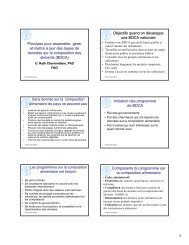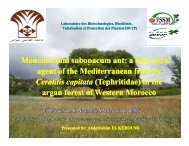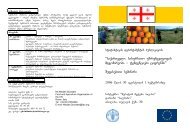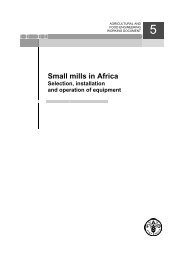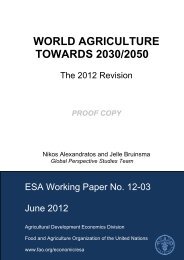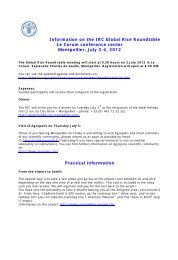Climate Change and Food Security: setting the track for the ... - FAO
Climate Change and Food Security: setting the track for the ... - FAO
Climate Change and Food Security: setting the track for the ... - FAO
Create successful ePaper yourself
Turn your PDF publications into a flip-book with our unique Google optimized e-Paper software.
practices, <strong>the</strong>y have been doing it <strong>for</strong> decades!). Small producers should not be at <strong>the</strong> end of <strong>the</strong><br />
process, waiting <strong>for</strong> a proposed or imposed solution…..If this is <strong>the</strong> way things will be done, it<br />
will be a complete failure!<br />
Elisabeth Pitteloud<br />
Swiss Development Agency<br />
<strong>Food</strong> <strong>Security</strong>, DRR <strong>and</strong> Water<br />
35. Ignatius Onimawo from <strong>the</strong> Ambrose Alli University, Nigeria<br />
Dear Moderator,<br />
My main concern on this discussion on climate change <strong>and</strong> food security is in <strong>the</strong> areas of some<br />
developing countries with poor wea<strong>the</strong>r <strong>for</strong>ecast <strong>and</strong> meteorological services. Many developing<br />
countries still largely depend on rain fed agriculture. In fact in some cases <strong>the</strong> farmers who are<br />
used to planting <strong>the</strong>ir crops in a particular month of <strong>the</strong> year which corresponds to <strong>the</strong> onset of<br />
rains have not understood <strong>the</strong> problems of climate change. These farmers still plant <strong>the</strong>ir crops<br />
expecting <strong>the</strong> rains to come but have found that <strong>the</strong> rains simply refuse to come during such<br />
months. When eventually <strong>the</strong> rains come <strong>the</strong>y come in torrents leading to heavy flooding. All<br />
<strong>the</strong>se have serious adverse consequences both on food <strong>and</strong> nutrition security of many farming<br />
households. This is particularly true in Nigeria. There is <strong>the</strong> need to emphasize early <strong>and</strong> timely<br />
dissemination of in<strong>for</strong>mation on wea<strong>the</strong>r <strong>for</strong>ecast to farmers as part of <strong>the</strong> extension system.<br />
The extension workers <strong>the</strong>mselves need to be trained in order to effectively disseminate such<br />
in<strong>for</strong>mation.<br />
Prof Ignatius Onimawo<br />
President Nutrition Society of Nigeria<br />
Ambrose Alli University, Ekpoma, Nigeria<br />
36. Raymond Erick Zvavanyange from <strong>the</strong> National Chung Hsing University of<br />
Taiwan, Taiwan Province of China<br />
Dear Moderator<br />
The scope is appropriate.<br />
I partially agree with <strong>the</strong> contribution from Alberto Saldam<strong>and</strong>o in which <strong>the</strong> contributor briefly<br />
touched on effects from industries. This is a silent issue which cuts across several <strong>the</strong>mes that<br />
this <strong>for</strong>um has addressed (<strong>and</strong> will address in future). Seen in ano<strong>the</strong>r way, it's industries on one<br />
side <strong>and</strong> local communities on <strong>the</strong> o<strong>the</strong>r. The objective is obviously not to replace one system by<br />
<strong>the</strong> o<strong>the</strong>r but possibly to have a leveraging point. In my opinion putting emphasis on <strong>the</strong><br />
recommendations from available funded <strong>and</strong> non-funded studies which focused on climate<br />
change <strong>and</strong> food security in <strong>the</strong> vulnerable regions <strong>and</strong> people can <strong>for</strong>m a good foundation <strong>for</strong><br />
drafting of effective policies.<br />
37. David Steane from Thail<strong>and</strong><br />
Dear Sir,<br />
May I suggest that <strong>the</strong> study looks at <strong>the</strong> implications <strong>for</strong> livestock production systems <strong>and</strong><br />
breeding programmes given that <strong>the</strong> feed crops available, crop residues <strong>and</strong> <strong>the</strong>ir bi-products<br />
will change in different areas <strong>and</strong> also <strong>the</strong> animal breeding programmes will need to take such<br />
changes into account in order to provide security. The integration of all aspects will surely<br />
__________________________________<br />
Global Forum on <strong>Food</strong> <strong>Security</strong> <strong>and</strong> Nutrition<br />
http://km.fao.org/fsn<br />
26



